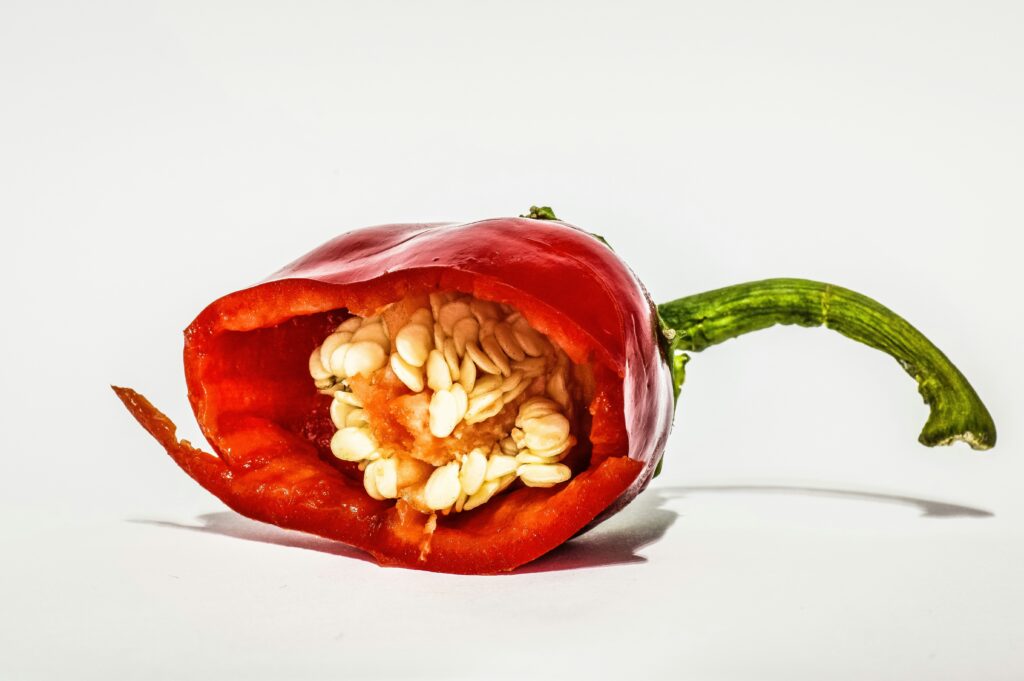The Carolina Reaper isn’t your average chili pepper. As the world’s hottest pepper, it’s both feared and revered by spice enthusiasts for its mind-blowing heat, measuring up to 2.2 million Scoville Heat Units (SHU).
But beyond the thrill of spice challenges, some wonder if this fiery food could hold the key to a longer life. Could eating Carolina Reapers and their potent capsaicin content contribute to longevity?

What Are Carolina Reapers?
Carolina Reapers were bred in South Carolina by Ed Currie, a chili pepper grower who combined the traits of a Pakistani Naga pepper and a red Habanero. The result was a pepper so hot it holds the Guinness World Record for the spiciest chili on Earth.
Carolina Reapers owe their heat to capsaicin, the compound responsible for the burning sensation when eating spicy foods. Beyond the heat, they also contain a range of nutrients like vitamins A and C, as well as antioxidants that could play a role in supporting health.
The fascination with Carolina Reapers goes beyond their culinary use. They’ve become a cultural phenomenon, with spice enthusiasts and daredevils competing to see who can handle the most heat. But could this extreme pepper offer more than just a thrill?
The Science of Capsaicin
Capsaicin is the active ingredient in chili peppers that binds to the TRPV1 receptors in your body—these are the same receptors that detect heat or physical pain. When you eat something spicy, your brain interprets the sensation as “burning,” even though no actual damage is occurring.
Research into capsaicin has uncovered a range of health benefits:
- Pain Relief: Capsaicin is often used in topical creams to relieve arthritis or nerve pain by desensitizing nerve receptors over time.
- Metabolism Boost: Capsaicin is known to increase thermogenesis (heat production), helping to burn calories.
- Anti-Inflammatory Effects: Capsaicin has shown promise in reducing chronic inflammation, a key contributor to aging and many diseases.
These findings suggest that consuming capsaicin-rich foods like Carolina Reapers could have positive effects on the body, but how does this relate to longevity?
Potential Longevity Benefits of Capsaicin
- Metabolism Boost and Weight Management Studies have shown that capsaicin can increase metabolic rate and promote fat oxidation. Maintaining a healthy weight is closely linked to longevity, as obesity increases the risk of heart disease, diabetes, and other chronic conditions. Adding capsaicin to your diet may help regulate body weight and improve overall health.
- Heart Health Capsaicin may support cardiovascular health by lowering LDL cholesterol (the “bad” cholesterol) and improving blood circulation. Healthy blood vessels and reduced cholesterol levels are vital for preventing heart disease, the leading cause of death worldwide.
- Anti-Inflammatory Properties Chronic inflammation is a major contributor to aging and age-related diseases like Alzheimer’s and arthritis. Capsaicin’s ability to reduce inflammation could help protect against these conditions, promoting a longer and healthier life.
- Antioxidant Effects Carolina Reapers are packed with antioxidants, which combat free radicals—unstable molecules that cause cellular damage and accelerate aging. By neutralizing these free radicals, capsaicin may help slow the aging process at a cellular level.
Risks and Considerations
Despite its potential benefits, eating Carolina Reapers isn’t for everyone. The extreme heat can cause digestive issues, including stomach cramps, acid reflux, and even nausea.
Consuming large amounts of capsaicin can also lead to nerve desensitization over time, reducing your ability to taste spice.
Moderation is crucial. Incorporating a variety of chili peppers with lower Scoville ratings into your diet may offer similar health benefits without the intense discomfort of Carolina Reapers.
Research Spotlight
A groundbreaking 2015 study published in The BMJ followed over 500,000 Chinese adults for seven years. Researchers found that those who ate spicy foods regularly (six or seven times per week) had a 14% lower risk of death compared to those who rarely consumed spicy foods.
While the study didn’t focus specifically on Carolina Reapers, it highlights the potential link between capsaicin and increased lifespan.
Another study suggested that capsaicin might activate TRPV1 channels in a way that improves metabolism and prevents obesity-related diseases. However, further research is needed to fully understand the long-term effects of consuming extremely spicy foods.
Practical Tips for Incorporating Capsaicin Safely
Want to enjoy the potential benefits of capsaicin without overdoing it? Here are some tips:
- Start Slow: If you’re not used to spicy foods, begin with milder peppers like jalapeños or serranos before working your way up to Carolina Reapers.
- Add Heat Gradually: Incorporate small amounts of chili powder or hot sauce into your meals to build tolerance.
- Balance the Heat: Pair spicy foods with cooling ingredients like yogurt, avocado, or coconut milk to make them more palatable.
- Try Recipes: Experiment with dishes like spicy stir-fries, soups, or chili to enjoy the benefits of capsaicin in a flavorful way.
Carolina Reapers are more than just a fiery challenge for spice enthusiasts—they’re a fascinating source of capsaicin with potential health benefits.
From boosting metabolism to reducing inflammation, the science behind capsaicin suggests that it could play a role in promoting longevity. However, the key to reaping these benefits lies in moderation and balance.
While eating Carolina Reapers alone won’t guarantee a longer life, they might just add a flavorful spark to a healthy, balanced diet.
So, the next time you reach for something spicy, remember: a little heat might do more than just set your taste buds on fire—it could help you live a longer, healthier life.









